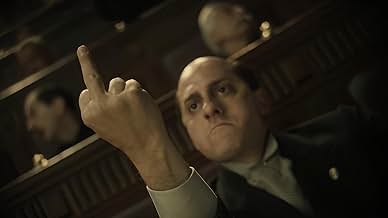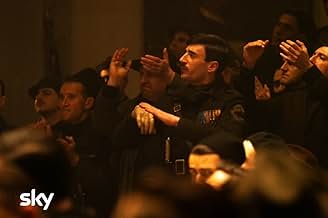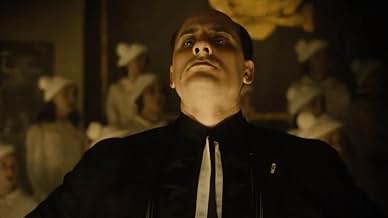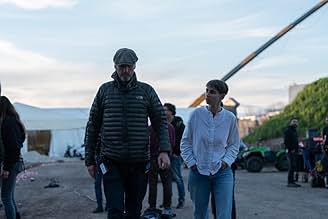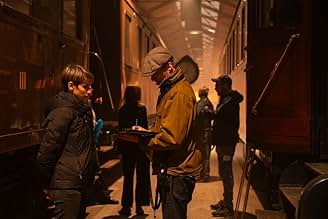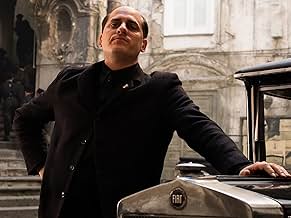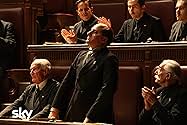Benito Mussolini's early career from his founding of the Fasci Italiani in 1919 up to the assassination of socialist politician Giacomo Matteotti in 1924 and his speech in Parliament on 3 Ja... Read allBenito Mussolini's early career from his founding of the Fasci Italiani in 1919 up to the assassination of socialist politician Giacomo Matteotti in 1924 and his speech in Parliament on 3 January 1925.Benito Mussolini's early career from his founding of the Fasci Italiani in 1919 up to the assassination of socialist politician Giacomo Matteotti in 1924 and his speech in Parliament on 3 January 1925.
- Awards
- 2 wins total
Browse episodes
Featured reviews
While the cinematography is out for everyone to appreciate, I feel a need to stress a couple of key points international audiences might miss.
First and foremost: the series is based on the first of four books about the life of Mussolini, and while they are routinely described as "novels", they are in fact impressively researched from a historical point. Pretty much every dialogue, speech, document and event are openly sourced and beyond question.
While the staging frequently and blatantly is not realistic in order to make the show more spectacular, pretty much everything happened as you see it - including a D'Annunzio's Japanese samurai secretary and other apparently absurd elements.
My second point is about the acting and language. While it will fly above the heads of anyone not _very_ experienced with Italian, the work behind regional accents, lapses into dialects and the very speech patterns of 100 years ago is exceptional indeed. It is a shame this will mostly go unnoticed, as it actually conveys a fair bit of refinement to an already stellar ensemble performance.
Lastly, the (not present in the books) stabs at current politics are far more varied than expected. Like, everyone can understand a sudden fourth-wall-breaking "Make Italy Great Again!", but you'll probably miss the reference to the catastrophic Berlusconi era (delivered via subtle voice and body acting, or even just a brief costume change), or to the sorry state of the last few recent Italian legislatures.
In short: come for the show, stay for the history lesson... and see it with an Italian resident if you can to enjoy it at its fullest.
First and foremost: the series is based on the first of four books about the life of Mussolini, and while they are routinely described as "novels", they are in fact impressively researched from a historical point. Pretty much every dialogue, speech, document and event are openly sourced and beyond question.
While the staging frequently and blatantly is not realistic in order to make the show more spectacular, pretty much everything happened as you see it - including a D'Annunzio's Japanese samurai secretary and other apparently absurd elements.
My second point is about the acting and language. While it will fly above the heads of anyone not _very_ experienced with Italian, the work behind regional accents, lapses into dialects and the very speech patterns of 100 years ago is exceptional indeed. It is a shame this will mostly go unnoticed, as it actually conveys a fair bit of refinement to an already stellar ensemble performance.
Lastly, the (not present in the books) stabs at current politics are far more varied than expected. Like, everyone can understand a sudden fourth-wall-breaking "Make Italy Great Again!", but you'll probably miss the reference to the catastrophic Berlusconi era (delivered via subtle voice and body acting, or even just a brief costume change), or to the sorry state of the last few recent Italian legislatures.
In short: come for the show, stay for the history lesson... and see it with an Italian resident if you can to enjoy it at its fullest.
The film presents the beginnings of Benito Musollini's political career. But to a greater extent it is a study of the creation of a dictatorship. And this is a universal and timeless phenomenon.
What is unusual is the form, which may put off some viewers. The main character often speaks directly to the audience, presents his thoughts and comments on the events taking place, sometimes these allusions are current, e.g. In episode four when he says the slogan MIGA (you will understand when you see it). It is a really great scene.
The film is also quite baroque, at times surreal.
The acting makes a great impression. Luca Marinelli (Musollini) behaves on screen like his prototype. If you know the history and have seen Mussolini's grotesque speeches, you can imagine that this required great skills. Other roles, although episodic, are also worth attention. For example, Benedetta Cimatti is great as the suppressed wife of the Duce.
Due to the specific form of the film, some viewers may be put off by it.
But it's a very good movie.
What is unusual is the form, which may put off some viewers. The main character often speaks directly to the audience, presents his thoughts and comments on the events taking place, sometimes these allusions are current, e.g. In episode four when he says the slogan MIGA (you will understand when you see it). It is a really great scene.
The film is also quite baroque, at times surreal.
The acting makes a great impression. Luca Marinelli (Musollini) behaves on screen like his prototype. If you know the history and have seen Mussolini's grotesque speeches, you can imagine that this required great skills. Other roles, although episodic, are also worth attention. For example, Benedetta Cimatti is great as the suppressed wife of the Duce.
Due to the specific form of the film, some viewers may be put off by it.
But it's a very good movie.
Interesting drama about the rise to power in Italy of Mussolini. Though did not like when he spoke to the camera as took away the intrigue of it all.
But the real powerhouse of this series is the performance of Luca Marinelli as the dictator, he is truly magnificent and gave out strong reminders of Robert De Niro in his pomp, and dominates every scene he is in Before watching this only really knew of Benito Mussolini from World War Two, so this was an eye opener of a history lesson.
I would be interested in a second series if it happens but mainly just to see Marinelli in action again as he truly is the best thing about it all.
But the real powerhouse of this series is the performance of Luca Marinelli as the dictator, he is truly magnificent and gave out strong reminders of Robert De Niro in his pomp, and dominates every scene he is in Before watching this only really knew of Benito Mussolini from World War Two, so this was an eye opener of a history lesson.
I would be interested in a second series if it happens but mainly just to see Marinelli in action again as he truly is the best thing about it all.
For those who have any interest in history, politics, and lessons on human nature, this is the show for you. Seeing the rise of Mussolini in such a way - with Luca Marinelli frequently breaking the fourth wall to speak to us, his audience - keeps it captivating and really holds up to the meta spectacle of his character. Despite the seriousness of the topic, the biting sarcasm and amusing moments keep it entertaining, too. Of course, for anyone who's been following the recent global rise in certain political trends, they'll undoubtedly feel a little uneasy when recognizing the patterns in today's day and age. An impressive production, Luca Marinelli's portrayal of the famous Italian dictator is downright stupendous. A wholehearted recommendation to watch and be amazed by M - Son of the Century.
Best Most Engrossing TV In Years.
I don't know how much of the Parliamentary madness is historically accurate, how much the birth of Fascism was accurate either, what I do know this series is giving me and anyone who takes the time to engage with the movement the phenomenon called Fascism build by a human being who cut out the representative instinct, the fundamental purpose of Legitimate Representation, the instruments that since the Athenian experiment was found to successfully create, control the masses. The tools to create a society.
Mussolini brought this idea into our world. The use of chaos into politics. That by changing your position, saying the insayable, thinking the unthinkable you can take control of millions of people.
Mussolini proposed to do the impossible and made people believe he had done it. He unbalanced his opponents. The whole body politic couldn't construct a coherent strategy to combat him.
Sensible, pragmatic policies are forgotten as those who think otherwise gasp for breath.
And Benito with his grasp of how the prolaterate thought. How he instructed them to believe "His Message". The truth was never considered. Benito was the 1st. All our modern demi gods use El Duce play book. No Hitler. No Franco. No Pinochet. No Pol Pot. No Saddam without Mussolini.
El Duce thought them all.
And we laugh at him. Maybe its us that are the fools.
Who'll be next to use his bag of tricks?
So now we have this magnificent expose of control by an English director an Italian writer and Rupert Murdochs Sky putting the money, the distribution, the lesson on how not to be a politician in front of us.
The "Making Of" might be a mini series for another day.
To think till now "Gomorrah" was the height of our appreciation for Italian modern story telling. And season 1 ends with Matteotti murder. What a rich vein of contemporary instruction lays before us.
By the way. This is Magnificent. A 10 all day long and double on Sunday.
I don't know how much of the Parliamentary madness is historically accurate, how much the birth of Fascism was accurate either, what I do know this series is giving me and anyone who takes the time to engage with the movement the phenomenon called Fascism build by a human being who cut out the representative instinct, the fundamental purpose of Legitimate Representation, the instruments that since the Athenian experiment was found to successfully create, control the masses. The tools to create a society.
Mussolini brought this idea into our world. The use of chaos into politics. That by changing your position, saying the insayable, thinking the unthinkable you can take control of millions of people.
Mussolini proposed to do the impossible and made people believe he had done it. He unbalanced his opponents. The whole body politic couldn't construct a coherent strategy to combat him.
Sensible, pragmatic policies are forgotten as those who think otherwise gasp for breath.
And Benito with his grasp of how the prolaterate thought. How he instructed them to believe "His Message". The truth was never considered. Benito was the 1st. All our modern demi gods use El Duce play book. No Hitler. No Franco. No Pinochet. No Pol Pot. No Saddam without Mussolini.
El Duce thought them all.
And we laugh at him. Maybe its us that are the fools.
Who'll be next to use his bag of tricks?
So now we have this magnificent expose of control by an English director an Italian writer and Rupert Murdochs Sky putting the money, the distribution, the lesson on how not to be a politician in front of us.
The "Making Of" might be a mini series for another day.
To think till now "Gomorrah" was the height of our appreciation for Italian modern story telling. And season 1 ends with Matteotti murder. What a rich vein of contemporary instruction lays before us.
By the way. This is Magnificent. A 10 all day long and double on Sunday.
Did you know
- TriviaWhen Joe Wright got on board as director, at first he meant to have the actors say their lines in English. Then he changed his mind and chose to shoot the series in Italian, for a higher immediacy.
- How many seasons does Mussolini: Son of the Century have?Powered by Alexa
Details
- Release date
- Countries of origin
- Official site
- Language
- Also known as
- Mussolini: Son of the Century
- Filming locations
- Production companies
- See more company credits at IMDbPro
- Runtime52 minutes
- Color
Contribute to this page
Suggest an edit or add missing content

![Watch Trailer Season 1 [OV]](https://m.media-amazon.com/images/M/MV5BYWM4MjYyMDktOWQwNy00NzNlLTg0OGUtZjk5Yzk0MjA2YmNlXkEyXkFqcGdeQXRyYW5zY29kZS13b3JrZmxvdw@@._V1_QL75_UX500_CR0)
